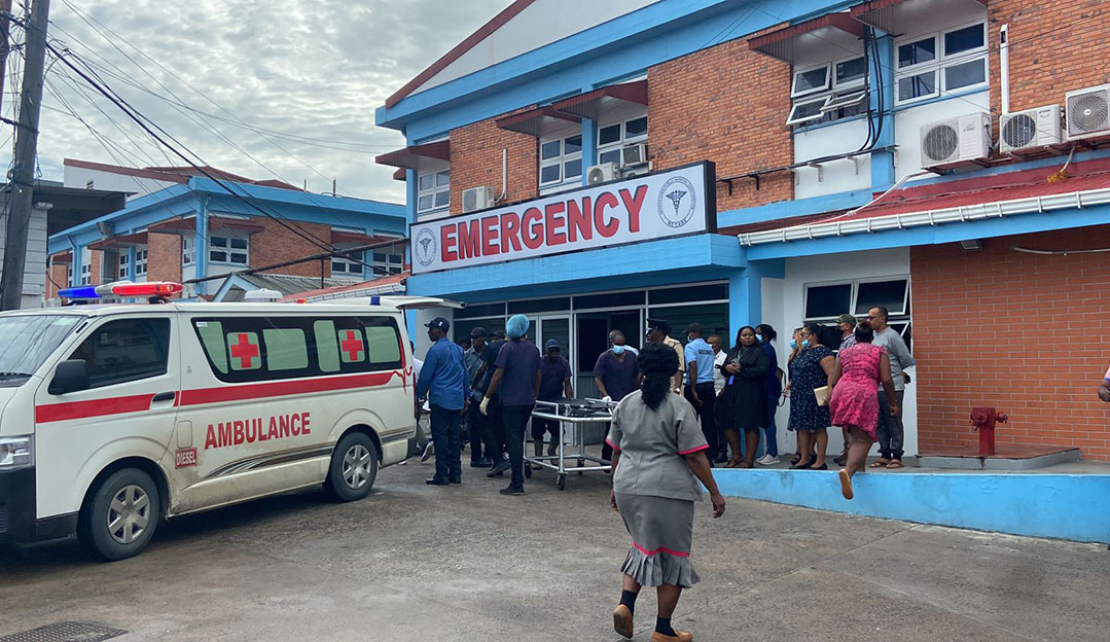GUYANA | Importing Foreign Nurses? What about working conditions for local health care workers ? asks Forde

georgetown, Guyana, August 1, 2023 - It is settled knowledge that the health of a nation rides high on the human resources of its healthcare system. Guyana has been spending multi billions of dollars, of tax-payers money, to train nurses, for decades. Yet, recently, the President admitted that we are facing a woeful shortage of nurses and other technical health staff.
 According to reports, the Georgetown Public Hospital Corporation is working with below its required strength of nurses. In fact, that health institution is in need of about 500 nurses. At the national level there is a shortage of over 1200 nurses.
According to reports, the Georgetown Public Hospital Corporation is working with below its required strength of nurses. In fact, that health institution is in need of about 500 nurses. At the national level there is a shortage of over 1200 nurses.
However, the surprisingly simplistic thinking and approach of the PPP/C government to address this extremely worrying shortage could only lead to further diminish the current number of nurses causing a diminution of that important sector of our society.
The government is seeking to import nurses from other countries, including Cuba. Mid-last week, certain sections of the media reported that President Irfaan Ali indicated that his government would turn to Cuba for emergency assistance with this shortage.
He said that he has already held talks with the Cuban Ambassador to Guyana: “to see if we can get Cuban nurses to come into the system now in the immediate period to help to fill that gap because of the immediate shortage that we have.”
It is true that nurses play a significant role in national public health care, particularly in the following ways:
(I) National primary healthcare delivery: nurses are often the first point of contact for patients seeking healthcare services. They are trained to provide comprehensive care, including preventive, curative, and rehabilitative services. They play a vital role in delivering primary healthcare services in remote and underserved areas, where doctors and specialists may be scarce.
(ii) Health awareness and education: nurses are well positioned to educate individuals and communities on preventive measures such as personal hygiene, nutrition, immunization, and family planning. Through their skills, they empower individuals to take responsibility for their own health and prevent the spread of diseases.
(iii) Disease prevention and control: well- trained nurses contribute to the surveillance, prevention, and control of diseases in local communities. They are trained to recognise public health threats, record and report infection diseases, and put in place effective infection control measures. This helps prevent outbreaks and ensures the timely and efficient management of potential health crises.
(iv) Maternal and child healthcare: nurses work to promote safe childbirth, delivering prenatal and postnatal care, and assisting new mothers. They assist with the well-being of both mothers and babies by carefully observing their health, administering vaccinations, and providing guidance on early childhood development.
(v) Non-communicable disease management: in developing countries, like Guyana, challenges and problems associated with of non- communicable, such as diabetes and hypertension, are steadily increasing. Trained nurses do work as primary healthcare providers in managing these conditions, educating patients on self- management techniques, and facilitating access to appropriate healthcare resources.
(vi) Collaborative care: nurses often work closely with doctors, pharmacists, and other healthcare professionals and technical staff to promote comprehensive patient care. Their contributions in multi- disciplinary teams help improve health outcomes and increase the efficiency of healthcare delivery systems in resources- limited settings.
 Some years ago, this very PPP/C government facilitated a study by the Pan American Health Organisation- Area of Health Systems based on Primary Health Care- Nurse migration in Guyana, 2011, Human Resources series No. 64. It was the then Minister of Health, Dr. Leslie Ramsammy, who said:
Some years ago, this very PPP/C government facilitated a study by the Pan American Health Organisation- Area of Health Systems based on Primary Health Care- Nurse migration in Guyana, 2011, Human Resources series No. 64. It was the then Minister of Health, Dr. Leslie Ramsammy, who said:
“Aware of the impact that migration of human resources for health can have on the health system in Guyana, the Ministry of Health, with technical cooperation from PAHO/WHO and funding from the US President’s Emergency Plan for AIDS Relief (PEPFAR), took the lead in commissioning a study on nurse migration in Guyana. This study will surely contribute to the future definition of actions for an integrated approach to this challenge, not only for the nursing sector, but also for other groups of health workers”. Therefore, it is clear that, the government has always been aware of this challenge to our national healthcare system.
The significance and effect of the migration of health workers has been carefully studied by Pan American Health Organisation/World Health Organization (PAHO/WHO). The challenge of migration is seen in PAHO’s Regional Goals for Human Resources for Health 2007-2015. The Goals points to the fact that the increasing need for scarce human resources is likely to increase the international migration of health workers in the future. This could encourage the destabilisation of work force in poor and developing countries.
Further, the report pointed out that the countries nurses from Guyana usually migrate to are: USA, Caribbean Islands Canada and UK. And that very few nurses return to this country. As well, the data from the study also showed that in so far as internal migration is concerned, there is a small national market. Nurses, who migrated to the private sector healthcare facilities indicated that good physical facilities, adequate equipment and supplies and overall work conditions, as reasons for shifting to this sector.
In that very study, certain strategies were recommended to retain our nurses. These include: Improve workplace conditions such as staffing levels, safety, physical facilities, supplies and equipment; create positive practice work environments by putting in place the requirements; establish staffing patterns and blueprints for the health care facilities in line with identified needs and organizational philosophy; advance the achievement of national health systems strategic goals by staffing health care facilities with appropriate educationally prepared and experienced nurses; provide structures, systems and protocols to facilitate maintenance of standards of care; create Centres of Excellence in the hospitals, health centres, schools of nursing supported by evidence-based practice; improve conditions of service; improve the appointment process by reducing the ‘wait period’; improve salaries commensurate with the level of nursing education and experience, outstanding performance, workplace location, and level of patient acuity.
Other recommendations encourage the government to : improve other benefits, such as shift differentials and remote pay differentials; provide and/or support incentives, such as financial/soft bank loans for homes, cars, and other necessities; non-financial /create protocols for best practice and award; enhance the education and professional development process of nurses by providing access and support to professional development activities based on the needs of the health services, as well as the needs of experienced nurses; recognize the individual nurse merit and excellence; create work environments that foster professional accountability, allowing nurses autonomy in decision-making with respect to the nursing profession; develop career structures, which enable career mobility based on advanced education preparation and experience and tangible acknowledgement of advanced education prepared nurses; develop a cadre of nurse leaders; chart a strategic direction for the development/strengthening of nursing; establish and manage a national dynamic health human resources information system
We are not sure what has become of this report or which recommendations the government implemented for it. Or is it a case, where this report suffered a similar fate as the one by UNICEF on extant negative conditions of dormitory schools in the hinterlands of Guyana? That report was never actioned by the government. It was dusted and opened after the massive fire at Mahdia that claimed the precious lives of nineteen of our children.
It seems pretty basic that if the government review that report and implement even a few of those recommendations then there would be no need to import nurses. In particular if the government relook at the remuneration package it is offering to our nurses then our nurses are likely to stay and serve. But the government cannot pay nurses less than $200,000 [less than USD$600] per month and expect them to stay in the local health sector. Many of these nurses are single parents with at least two children. Add to that the rising cost of living and the picture of our nurses going through hardship and struggle appears clear.
But there are two other fundamental factors, we, as Guyanese, must consider on this question of importing nurses from other countries:
First, local culture: the interplay between local culture and public healthcare in developing countries is both complex and multifaceted. Cultural beliefs, practices, and social norms heavily influence the way healthcare is provided and accessed, and they can significantly impact the success or failure of public healthcare initiatives. Two other significant issues need to be considered: trust and communication. Cultural competence, which involves understanding and respecting cultural differences, is vital for effective communication. Public healthcare initiatives need to focus on cultural appropriate communication methods to ensure accurate information and dissemination and encourage community participation.
Second, optimum use of resources: the government uses the nation’s resources, including tax dollars to train our nurses. The legitimate expectation of Guyanese is that those healthcare workers, who have been and are being trained, with the resources of the state should provide vital healthcare services to the citizens of this country. This would reflect or demonstrate not only money well spent but also boost and sustain the health of our citizens. A healthy nation is likely to result in a healthy economy, prosperity and sustainable development.
